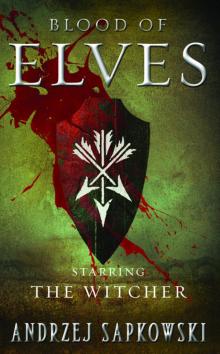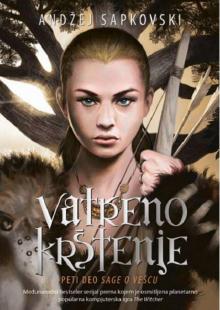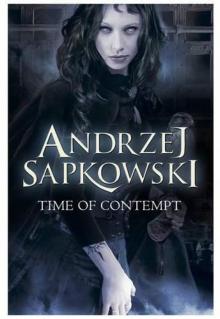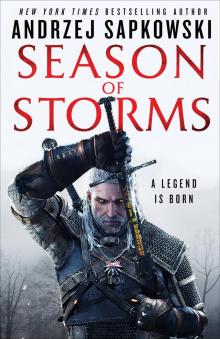- Home
- Andrzej Sapkowski
Season of Storms Page 5
Season of Storms Read online
Page 5
The Witcher Geralt, about whom the sorceress had heard a great deal, about whom she had acquired much information, and whom she was right then observing in the fountain, met but one of the above conditions, it appeared.
“Mozaïk!”
“Yes, madam.”
“We’re going to have a guest. Everything is to be suitably prepared and elegant. But first bring me a gown.”
“The tea rose? Or the aquamarine?”
“The white one. He dresses in black, we’ll treat him to yin and yang. And sandals, select something matching, make sure they have at least four-inch heels. I can’t let him look down on me too much.”
“Madam … That white gown …”
“Yes?”
“It’s, well …”
“Modest? Without any ornamentation or furbelows? Oh, Mozaïk, Mozaïk. Will you ever learn?”
He was met in the doorway by a burly and pot-bellied bruiser with a broken nose and little piggy eyes, who searched Geralt from head to toe and then once again the other way. Then he stood back, giving a sign for the Witcher to pass.
A girl with smoothly combed—almost slicked-down—hair was waiting in the anteroom. She invited him in with a gesture, without uttering a single word.
He entered straight onto a patio dotted with flowers and a splashing fountain in the centre. In the middle of the fountain stood a small marble statue portraying a naked, dancing girl. Apart from the fact that it was sculpted by a master, the statue was conspicuous for another detail—it was attached to the plinth at a single point: the big toe of one foot. In no way, judged the Witcher, could the construction be stable without the help of magic.
“Geralt of Rivia. Welcome. Do come in.”
The sorceress Lytta Neyd was too sharp-featured to be considered classically beautiful. The warm peach shade of rouge on her cheekbones softened the sharpness but couldn’t hide it. Her lips—highlighted by coral-red lipstick—were so perfectly shaped as to be too perfect. But that wasn’t what mattered.
Lytta Neyd was a redhead. A classic, natural redhead. Her hair’s mellow, light russet evoked associations with a fox’s summer coat. If one were to catch a red fox and place it alongside her—Geralt was quite convinced about this—the two of them would prove to be identically coloured and indistinguishable from each other. And when the sorceress moved her head, lighter, yellowish accents lit up among the red, identical to a fox’s fur. That type of red hair was usually accompanied by freckles—usually in excess. That wasn’t the case with Lytta.
Geralt felt an anxiety, forgotten and dormant, suddenly awaking somewhere deep inside him. He had a strange and inexplicable inclination towards redheads in his nature, and several times that particular colouring had made him do stupid things. Thus he ought to be on his guard, and the Witcher made a firm resolution in that regard. His task was actually made easier. It was almost a year since he’d stopped being tempted by that kind of stupid mistake.
Erotically alluring red hair wasn’t the sorceress’s only attractive attribute. Her snow-white dress was modest and utterly without effects, which was the aim, the intended aim, and without the slightest doubt deliberate. Its simplicity didn’t distract the attention of the observer, but focused it on her attractive figure. And the plunging cleavage. To put it concisely, Lytta Neyd could easily have posed for an engraving accompanying the chapter “Impure Desire” in the illustrated edition of the prophet Lebioda’s Good Book.
To put it even more concisely, Lytta Neyd was a woman whom only a complete idiot would have wanted to have relations with for longer than two days. It was curious that women like that were usually pursued by hordes of men inclined to stay for much longer.
She smelled of freesias and apricots.
Geralt bowed and then pretended the statue in the fountain was more interesting than her figure and cleavage.
“Come in,” repeated Lytta, pointing at a malachite-topped table and two wicker armchairs. She waited for him to sit down, then as she was taking her place showed off a shapely calf and a lizard skin sandal. The Witcher pretended his entire attention was absorbed by the carafes and fruit bowl.
“Wine? It’s Nuragus from Toussaint, in my opinion more compelling than the overrated Est Est. There is also Côte-de-Blessure, if you prefer red. Pour please, Mozaïk.”
“Thank you.” He took a goblet from the girl with the slicked-down hair and smiled at her. “Mozaïk. Pretty name.”
He saw terror in her eyes.
Lytta Neyd placed her goblet on the table. With a bang, meant to focus his attention.
“What brings the celebrated Geralt of Rivia to my humble abode?” She tossed her shock of red curls. “I’m dying to find out.”
“You bought me out,” he said, deliberately coolly. “Paid my bail, I mean. I was released from gaol thanks to your munificence. Where I also ended up because of you. Right? Is it because of you I spent a week in a cell?”
“Four days.”
“Four days. I’d like to learn, if possible, the motives behind those actions. Both of them.”
“Both?” She raised her eyebrows and her goblet. “There’s one. And only one.”
“Oh.” He pretended to be devoting all his attention to Mozaïk, who was busying herself on the other side of the patio. “So you informed on me and got me thrown into the clink, and then got me out for the same reason?”
“Bravo.”
“So, I ask: why?”
“To show you I can.”
He took a sip of wine. Which was indeed very good.
“You proved that you can,” he nodded. “In principle, you could have simply told me that, by meeting me in the street, for instance. I would’ve believed it. You preferred to do it differently. And forcibly. So, I ask: what now?”
“I’m wondering myself.” She looked at him rapaciously from under her eyelashes. “But let’s leave things to take their own course. In the meantime, let’s say I’m acting on behalf of several of my confraters. Sorcerers who have certain plans regarding you. These sorcerers, who are familiar with my diplomatic talents, chose me as the right person to inform you about their plans. For the moment that is all I can disclose to you.”
“That’s very little.”
“You’re right. But for the moment, I’m ashamed to admit, I don’t know any more myself. I didn’t expect you to show up so quickly, didn’t expect you to discover so quickly who paid your bail. Which was, they assured me, to have remained a secret. When I know more I shall reveal more. Be patient.”
“And the matter of my swords? Is that part of the game? Of the plans of those mysterious sorcerers? Or is that further proof of your capabilities?”
“I don’t know anything about the matter of your swords, whatever it might mean or concern.”
He wasn’t entirely convinced. But he didn’t delve further into the subject.
“Your confrater sorcerers have recently been trying to outdo each other in showing me antipathy and hostility,” he said. “They’re falling over one another to antagonise me and make my life difficult. I expect to find their interfering fingerprints in every misadventure that befalls me. It’s a catalogue of unfortunate coincidences. They throw me into gaol, then release me, then communicate that they have plans for me. What will your confraters dream up this time? I’m afraid even to speculate. And you order me to be patient, most diplomatically, I admit. But I don’t have a choice. After all, I have to wait until the case triggered by that tip-off comes before the court.”
“But meanwhile,” the sorceress smiled, “you can take full advantage of your liberty and enjoy its benefits. You have been released pending trial. If the case comes before the court at all, which isn’t by any means certain. And even if it does, you don’t have any reason to be anxious, believe me. Trust me.”
“Trust may come a bit harder,” he retorted, with a smile. “The actions of your confraters in recent times have severely taxed my trust. But I shall try hard. And now I shall be on my way. To trust and wait
patiently. Good day.”
“Don’t go yet. Stay a while longer. Mozaïk, wine.”
She changed her position on the chair. The Witcher continued to stubbornly pretend he couldn’t see her knee and thigh in the split of her skirt.
“Oh well,” she said a moment later. “There’s no point beating about the bush. Witchers have never been highly thought of in our circles, so it sufficed to ignore you. At least up to a certain moment.”
“Until—” he’d had enough of fudging “—I embarked on a romance with Yennefer.”
“No, no, you’re mistaken.” She fixed eyes the colour of jade on him. “Twice over, actually. Primo, you didn’t embark on a romance with Yennefer, but she with you. Secundo, the liaison didn’t shock many of us, we’re no strangers to excesses of that kind. The turning point was your parting. When did it happen? A year ago? Oh, how time flies …”
She made a dramatic pause, counting on a reaction from him.
“Exactly a year ago,” she continued, when it became clear there would be no reaction. “Some members of our community—not many, but influential—deigned to notice you. No one was clear what precisely occurred between you. Some of us thought that Yennefer, after coming to her senses, broke off with you and kicked you out. Others dared to suppose that you, after seeing through her, ditched her and took to your heels. Consequently, as I mentioned, you became the object of interest. And, as you correctly guessed, antipathy. Why, there were those who wanted you punished in some way. Fortunately for you the majority thought it not worth the trouble.”
“What about you? What part of the community do you belong to?”
“Those whom your love affair merely entertained, if you can imagine.” Lytta twisted her coral lips. “And occasionally amused. And occasionally supplied with true sporting thrills. I personally have to thank you for a significant influx of cash, Witcher. Bets were laid about how long you’d last with Yennefer—the stakes were high. My wager, as it turned out, was the most accurate. And I scooped up the pot.”
“In that case, it’d be better if I went. I oughtn’t to visit you, we oughtn’t to be seen together. People are liable to think we fixed the bet.”
“Does it bother you what they’re liable to think?”
“Not a lot. And I’m delighted with your win. I’d planned to refund you the five hundred crowns you put up as bail. But since you scooped up the pot betting on me, I no longer feel obliged. Let’s call it quits.”
“I hope the mention of refunding the bail doesn’t betray a plan to escape and flee? Without waiting for the court case?” An evil gleam appeared in Lytta Neyd’s green eyes. “No, no, you don’t have any such intention; you can’t have. You know, I’m sure, that it would send you back into the slammer. You do know that, don’t you?”
“You don’t have to prove to me you can do it.”
“I’d prefer not to have to. I mean that most sincerely.”
She placed her hand on her cleavage, with the clear intention of drawing his gaze there. He pretended not to notice and shifted his eyes towards Mozaïk again. Lytta cleared her throat.
“With regard to settling up or sharing out the winnings from the wager,” she said, “you’re actually right. You deserve it. I wouldn’t dare to offer you money … But what would you say to unlimited credit at the Natura Rerum? For the time of your stay here? Because of me, your last visit ended before it began, so now—”
“No thank you. I appreciate your willingness and good intentions. But no, thank you.”
“Are you sure? Why, you must be. I needlessly mentioned … sending you to the slammer. You provoked me. And beguiled me. Your eyes, those strange, mutated eyes, so apparently sincere, endlessly wander … and beguile. You aren’t sincere, not at all. I know, I know, that’s a compliment, coming from a sorceress. You were about to say so, weren’t you?”
“Touché.”
“And would you be capable of sincerity? If I demanded it of you?”
“If you were to ask for it.”
“Oh. Let it be. So, I ask you. Why Yennefer? Why her and no one else? Could you explain it? Name it?”
“If this is another wager—”
“It’s not. Why exactly Yennefer of Vengerberg?”
Mozaïk appeared like a wraith. With a fresh carafe. And biscuits. Geralt looked her in the eyes. She turned her head away at once.
“Why Yennefer?” he repeated, staring at Mozaïk. “Why her, precisely? I’ll answer frankly: I don’t know myself. There are certain women … One look is enough …”
Mozaïk opened her mouth and shook her head gently. In terror. She knew. And was begging him to stop. But he’d already gone too far into the game.
“Some women attract you like a magnet,” he said, his eyes continuing to wander over the girl’s figure. “You can’t take your eyes off them …”
“Leave us, Mozaïk.” The sound of pack ice grating against iron could be heard in Lytta’s voice. “And to you, Geralt of Rivia, my thanks. For the visit. For your patience. And for your sincerity.”
A witcher sword (fig. 40) distinguishes itself by being, as it were, an amalgam of other swords, the fifth essence of what is best in other weapons. The first-rate steel and manner of forging typical of dwarven foundries and smithies lend the blade lightness, but also extraordinary resilience. A witcher sword is also sharpened in the dwarven fashion, a secret fashion, may we add, and one that shall remain secret forever, for the mountain dwarves guard their arts jealously. For a sword whetted by dwarves can cut in two a silken scarf thrown into the air. We know from the accounts of eyewitnesses that witchers were able to accomplish the same trick with their swords.
Pandolfo Forteguerra, A Treatise on Edged Weapons
CHAPTER SIX
A fleeting morning rainstorm freshened the air for a short time, after which the stench of refuse, burnt fat and rotting fish borne on the breeze from Palmyra once again became noisome.
Dandelion put Geralt up at the inn. The room the bard was occupying was cosy. In the literal sense—they had to cosy up to pass each other. Fortunately, the bed was big enough for two and was serviceable, although it creaked dreadfully and the paillasse had been compacted by travelling merchants, well-known enthusiasts of ardent extramarital sex.
Geralt—God knew why—dreamed of Lytta Neyd during the night.
They went to break their fast at the nearby market hall, where the bard had previously discovered that excellent sardines were to be had. Dandelion was treating him. Which didn’t inconvenience Geralt. After all, it had quite often been the other way around, with Dandelion taking advantage of Geralt’s generosity when he was skint.
So they sat at a roughly planed table and got down to crisply fried sardines, brought to them on a wooden platter as large as a barrow wheel. Dandelion looked around fearfully from time to time, the Witcher observed. And froze when it seemed to him that some passer-by was scrutinising them too persistently.
“You ought, think I, to get yourself some sort of weapon,” Dandelion finally muttered. “And carry it in plain sight. It’s worth learning from yesterday’s incident, don’t you think? Oh, look, do you see those shields and mail shirts on display? That’s an armourer’s. They’re bound to have swords there, too.”
“Weapons are prohibited in this town.” Geralt picked a sardine’s spine clean and spat out a fin. “Visitors’ weapons are confiscated. It looks as though only bandits can stroll around here armed.”
“Perhaps they can.” The bard nodded towards a passing ruffian with a long battleaxe on his shoulder. “But in Kerack the prohibitions are issued, enforced and punished for contravention by Ferrant de Lettenhove, who is, as you know, my cousin. And since the oldboy network is a sacred law of nature, we can make light of the local prohibitions. We are, I hereby state, entitled to possess and carry arms. Let’s finish breakfasting and go and buy you a blade. Good mistress! These fish are excellent! Please fry another dozen!”
“As I eat these sardines, I realise that
the loss of the swords was nothing but a punishment for my greed and snobbism.” Geralt threw away a well-chewed sardine skeleton. “For wanting a little luxury. Work came up in the vicinity, so I decided to drop into Kerack and feast at the Natura Rerum tavern, the talk of the town. While there were places I could have eaten tripe, cabbage and peas, or fish soup …”
“Incidentally—” Dandelion licked his fingers “—the Natura Rerum, although justly famous for its board, is only one of many. There are restaurants where the food is no worse, and possibly even better. For instance, the Saffron and Pepper in Gors Velen or the Hen Cerbin in Novigrad, which has its own brewery. Or alternatively the nearby Sonatina in Cidaris, with the best seafood on the entire coast. The Rivoli in Maribor and their capercaillie à la Brokilon, heavily larded with pork fat—heavenly. The Fer de Moline in Aldersberg and their celebrated saddle of hare with morels à la King Videmont. The Hofmeier in Hirundum. Oh, to pay a call there in the autumn, after Samhain, for roast goose in pear sauce … Or the Two Weatherfish, a few miles outside Ard Carraigh, an ordinary tavern on the crossroads, serving the best pork knuckle I’ve ever eaten … Why! Look who’s come to see us. Talk of the devil! Greetings, Ferrant … I mean, hmm … my lord instigator …”
Ferrant de Lettenhove approached alone, gesturing to his servants to remain in the street.
“Julian. Lord Rivia. I come with tidings.”
“I don’t deny that I’m getting impatient,” responded Geralt. “How did the criminals testify? The ones who attacked me yesterday, exploiting the fact that I was unarmed? They spoke of it quite loudly and openly. It’s proof they had a hand in the theft of my swords.”

 something ends something begins sapkowski
something ends something begins sapkowski The Last Wish
The Last Wish Baptism of Fire
Baptism of Fire Blood of Elves
Blood of Elves Lastavičja Kula
Lastavičja Kula Gospodarica Jezera
Gospodarica Jezera Vatreno Krštenje
Vatreno Krštenje Sezona Oluja
Sezona Oluja Lady of the Lake
Lady of the Lake The Road With No Return
The Road With No Return Time of Contempt
Time of Contempt Mač Sudbine
Mač Sudbine The Malady and Other Stories: An Andrzej Sapkowski Sampler
The Malady and Other Stories: An Andrzej Sapkowski Sampler The Saga of the Witcher
The Saga of the Witcher The Tower of Fools
The Tower of Fools Vreme Prezira
Vreme Prezira Introducing the Witcher
Introducing the Witcher Stephen Hulin
Stephen Hulin The Time of Contempt
The Time of Contempt The Sword of Destiny
The Sword of Destiny Season of Storms
Season of Storms The Tower of Swallows
The Tower of Swallows The Last Wish: Introducing The Witcher
The Last Wish: Introducing The Witcher The Lady of the Lake
The Lady of the Lake